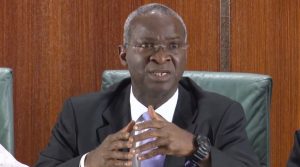
By Ajibola Olarinoye
The asymmetric rate between the growth of population and the development of housing sector in Nigeria is very high and this poses a dire consequence on the country’s socio-economic situation. Millions of Nigerian residents may be rendered homeless in years to come if the issue of huge housing deficit is not fixed. This calls for a serious concern as the population of the country keeps on exploding daily and many think that result-oriented policies are not being done to tackle the housing deficit issue.
Previous governments have made attempts towards addressing housing deficit by making provision of housing for citizenry; most especially, the low and middle-income earners in the country, but these attempts have not made consequential impact in meeting the ever growing housing needs of Nigerians.

Both state and Federal governments have Housing Boards or Corporations that are saddled with the onus of ameliorating the challenges of housing; however, many of these corporations are creaks under the strain because there impacts are not really being felt by the people. More so, billions of Naira is being sunk into housing sector by both the Federal and State governments every year without commensurate improvement.
For instance, several housing policies were embarked upon during the 70’s and the 80’s towards mitigating the housing challenge. During the regimes of Yakubu Gowon and Olusegun Obasanjo; several housing estates such as Gowon Estate, Festac Town were erected. Also, the Second Republic government of President Shehu Shagari designed policy of building 1000 low cost houses in each of the then 19 states of the entire country. The policy was meant to provide shelter for the low income earners.
In 1991 the government of Ibrahim Babangida also enacted a housing programme called National Housing Policy aimed at making housing affordable for Nigerians, mostly, the middle and low class people. Like the policies of his predecessors, this policy also went downhill as it was ineffective in finding solution to the housing problems.
The civilian government of Obasanjo in 2001 set up a Committee to come out with new housing policy that would make meaningful impact and solve the lingering challenge of housing. The report of the Committee was the template that midwifed the New National Housing policy of 2006. Despite its brilliant framework; the Policy was not different form the past ones as it failed to make practical impact. The former Minister of Housing, Ama Pepple in 2012 submitted a new draft Policy on the housing sector; up till now, none of those Policies have made remarkable impact.
It is against this background that many stakeholders have been advocating for strong participation of private bodies to make great input in the housing sector. They want the government to engage in active partnership with the private sector so as to nip the problem of housing deficit in the bud. They see the private sector participation as the panacea to this problem. One cannot jettison the view of the experts considering how the issue stands. For instance, China, with a massive population of 1.3billion people at present has housing surplus, compared with a lower population of Nigeria of about 180 million people that still has monumental housing deficit.
Many analysts are of the view that since all the housing policies of the government so far are more or less than pipe-dream promises that have not achieved tangible results; then there is need for enlarged or complete private sector participation in which the government is just to provide the enabling environment and functional infrastructure that would prop up the sector as it is obtained in other countries.
The Minister of Power, Works and Housing, Babatunde Fashola has voiced out that input of the private sector is highly needed so as to address the issue of wide deficit in housing sector which is estimated to be between 17 million to 20 million. The Minister said that the present government would put all hands on deck to partner the organised private sector with a view to tackling the alarming deficit.
In his remarks while touring some housing units built by the private sector, Fashola said: “from our first housing summit and the hosting of the Habitat 111, we clearly articulated that the National Housing Project of affordable housing was the way to go.The mission of the programme is to develop a system that will accommodate the design, building type, cost reduction and supply.
Fashola added: “Ultimately, government has never been able to supply unilaterally the need of the people; no government in the world has done that but we are doing our best to reduce cost. So if we really want to solve the problem, we are going to need the private sector to really come in and build as well as bridge the market demand.’’
Fashola disclosed that the advent of active private sector participation in the housing sector, also serves as a viable platform where many Nigerians would be gainfully employed, adding that it would help to a very high extent in addressing some of the socio-economic problems that are bedeviling the country.
Lending his voice on the matter, the Speaker of the House of Representatives, Yakubu Dogara has also advocated for a great synergy between the private sector and the government in dealing with the deficit.
In his words: “The government of the Federal Republic of Nigeria has a duty and responsibility to cater for the welfare of its people. Housing or shelter is one of the most important and fundamental needs of man. The very concept of human dignity requires that a man should have a roof over his head. This is what the Fundamental Objectives and Directive Principles of State Policy of the 1999 Constitution of Nigeria says.”
He added by saying: “Let me assure you of the determination of the House to collaborate with all stakeholders in ensuring supply of safe and affordable homes and provision of viable legislative frameworks that will lead to private sector participation and ownership in order to reduce these deficits.”
A very thorny issue affecting active private sector participation is the cost of the houses they are building as many of the houses are so expensive that they are far from the reach of the low and middle class which constitute majority of Nigeria’s population. Many of those houses range from N10m to N30 million Naira, even more than that, particularly, densely populated cities like Lagos, Abuja, Portharcourt and so on. For example, the housing units that Fashola inspected when he made the statements quoted in this piece cost N15 million, N27 million and N30 million. That is how it goes in many housing units built by private bodies. The least price you can get is N5million! You can hardly get the price that is lower.
However, many stakeholders are of the opinion that some unfavourable business environments in our clime, are affecting the private investors, noting that this formed their decision of charging exorbitant prices for their houses and estates. They added that government need to formulate policies that would make business working environment conducive for private bodies involve in real estate and housing business, so that they would be building affordable houses that the low and middle income class can benefit from.
One of the issues that constitute albatross to housing investors in Nigeria is the difficult modalities as regards their accessibility to mortgage facilities. In Nigeria, there are about 35 Primary Mortgage Banks (PMBs) and they charge considerable interest rates which range between 11 per cent to 27 per cent. Many of the commercial banks also toe the line of the PMBs as they demand a down payment of 25 per cent of the value of the mortgage with a repayment policy between 10-25 years. If compared to China that has housing surplus, their mortgage modalities is easier as they charge interest rate that are below 5 per cent. So, it is crystal clear that if this harsh mortgage policy in Nigeria is not tackled, the private bodies will continue to charge sky-high prices for their buildings because they need to recoup their investments. So, that is why stakeholders are saying that government needs to draw policy that will make the environment more conducive in the aspect of easier access to finance.
Speaking on the other reasons why private housing units are usually costly and beyond the reach of the common man, the Publicity Secretary of the Nigeria Institute of Building, Yakubu Musa cited the issue of land acquisition as part of the cogs in the wheel of private housing investors.
According to him, land allocation in Nigeria is mired in massive corruption in which land speculators who are willing to cough out huge amounts as bribe are the ones that get allocation directly from government; adding that the land would later be put into sale in an open market. He noted that only those who could afford enormous price would end up buying the land, lamenting that they would be forced to charge exorbitant price if they later used the land to construct housing units.
“land is expensive to acquire as it is usually sourced from either the government or the traditional land owners. Either way, land does not get directly to those who need them for housing development. As a result of this, by the time it gets to the prospective developer, the land is acquired at very expensive rate that will add up to the cost of the construction which invariably makes houses expensive and delivery a challenge,” Musa said.
He also cited the cases of critical infrastructures such as roads, drainages, electricity, portable water and telecommunications which are supposed to be put in place by government. He added that many places and areas in Nigeria lack those facilities and this make many developers put them in place, noting that this form part of the factors that make them charge high prices for the houses they build.
Adding further, Musa noted that unnecessary bureaucratic procedure in getting approval for housing development is another impediment hurdle, noting that these procedures smack of all forms of official rigmarole and stress in such a way that in some cases, greedy and corrupt officials deny sincere uncompromising developers’ approval until they have been forced to cough out considerable amount of money to facilitate the approval.
In his views, the Chairman, Faculty of Housing, Nigerian Institution of Estate Surveyors and Valuers (NIESV), Chika Okafor agreed that the sector will be highly dependent on government’s policy to determine the extent of its success, expressing misgiving that the Budget for housing might not make any significant impact in the housing sector this year.
He added that government must wake up and play its role the way it ought to be played so as to add a great boost to the sector. He called on the government to look into the provision and accessibility to lands and services, infrastructure such as roads, water and other pivotal infrastructural facilities so that the private sector would thrive.
In his words, “With the current provision for housing in the 2018 Budget, housing demand of Nigerians can never be achieved. Government should encourage the real estate developers by reducing charges so that they could develop houses for the masses. The sector can bounce back to its glorious days, if there is genuine willingness and commitment from the government, above all, the government has the key, our economy is government oriented. Genuine policies that would facilitate the provision and development of affordable houses must be made”.
So, it is apparent that government alone cannot solve this problem of housing alone considering unfruitful moves it has made in the past. Private bodies that should be the alternative are building houses which prices are outrageous and beyond the means of most Nigerians. However, experts believe that if government cooperates with the private sector in addressing the aforementioned challenges confronting it; perhaps, this could be a step forward in tackling the huge deficit.











